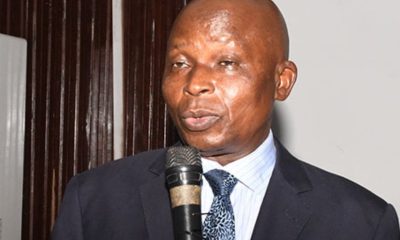Headline
Petrol subsidy: Association wants more interventions to cushion effects

The Association of Capital Market Academics of Nigeria (ACMAN) has appealed to the Federal Government to scale up efforts to ameliorate difficulties faced by Nigerians due to petrol subsidy removal.
The President of ACMAN, Prof. Uche Uwaleke said this in a news briefing on Wednesday in Abuja while assessing key policy measures rolled out by President Bola Tinubu in his first 100 days in office.
ACMAN is the umbrella body of lecturers and researchers in Nigeria’s university system and the financial market industry committed to development of Nigerian capital market through teaching, research and advocacy.
The event was held with a view to offering suggestions regarding the effective implementation of the policies.
Uwaleke commended the Federal Government for policies to end fuel subsidy and unify multiple exchange rates, saying that they seemed to boost confidence in the economy.
According to Uwaleke, the two policies which defined the administration’s first 100 days in office were largely welcomed by both domestic and foreign investors.
“Nowhere has this confidence manifested better than the stock market where the benchmark index (NGX ASI) hits the highest level ever in the history of Nigerian stock market.
“It is over 68000 points with year-to-date return now above 30 per cent.
“But these reforms have left in their wake unpalatable outcomes which have made life more difficult especially for the ordinary Nigerian.
“Inflation rate is on the rise with food prices largely unaffordable.
“There is evidence of declining economic activities with fewer vehicles on the roads and reduced work days in both private and public sectors.
“Similarly, not a few micro and small businesses have reduced their scale of operations due largely to inability to afford the high cost of fuel,’’ Uwaleke said.
He emphasised the need for a reduction in cost of governance and the money channelled toward cushioning the effects of petrol subsidy removal.
Uwaleke urged the Federal Government to scale up interventions in Micro Small and Medium Enterprises (MSMEs) and agriculture, saying that the current size is small at less than One trillion Naira.
“ We are convinced that more money can be made available to cushion the negative impact of fuel subsidy removal from reducing cost of governance, plugging revenue leakages and tackling the challenge of crude oil theft,’’ he said.
Uwaleke said that Nigeria looses over one billion dollars to crude oil theft monthly.
“A recent OPEC report puts the country’s crude oil output at 1.2mbpd indicating huge volume deficit of circa 500,000mbpd compared to the 2023 budget target of 1.69mbpd and the OPEC quota of 1.74mbpd.
“At a conservative crude oil price of USD85 per barrel, the loss to Nigeria in one month is over $1 billion.
“We believe that swiftly dealing with the menace of crude oil theft will put the Federal Government in a stronger position to scale up compensation measures.
“This includes the implementation of a new minimum wage for workers as well as the programme on food security expected to drive down prices,’’ he said.
Uwaleke further commended Tinubu for implementing some Executive Orders to suspend certain fiscal policies contained in the Finance Act 2023.
He also applauded the setting up of Presidential Committee on Fiscal Policy and Tax Reforms and the unveiling of his eight-point agenda.
Uwaleke also hailed Tinubu’s recent engagements with international investors in India and the UAE.
“We are excited by their prospects and hope the pledges made by these investors materialise in view of their potential long-term positive impact on external reserves, forex liquidity and job opportunities.
“To this end, the government must walk the talk regarding aspects of its eight-point agenda to do with security, rule of law and anti-corruption,’’ Uwaleke said.
He said that ACMAN was concerned that the forex market remained illiquid “and volatility in exchange rates has persisted despite the naira float policy that followed the unification of exchange rates’’.
“To make matters worse, the parallel premium has continued to widen seemingly defeating one of the objectives of the naira float,” Uwaleke said.
In view of the huge imports from China, Uwaleke said the association is of the view that the Central Bank of Nigeria (CBN) revisits the currency swap arrangement with China.
According to him, to a scale that reduces significantly the dependence on US dollars for imports from China.
On the supply side, he called for deliberate efforts to diversify the export base.
“The government should give support to the CBN in the implementation of RT 200 programme especially in relation to port reforms while it works on the ease of doing business to pave way for increased foreign investments.
“We believe that unlocking value in dead assets is one way to improve the country’s fiscal liquidity.
“We encourage the new administration to speed up the process of privatising government enterprises, including the NNPCL, not by selling to a few individuals or companies but through the capital market for transparency and inclusiveness,’’ he said.
Uwaleke also urged the Federal Government to explore asset securitisation as a means of financing developmental projects in the country.
Headline
Fagbemi warns against obstructing EFCC from performing its lawful duty

The Minister of Justice, Lateef Fagbemi, SAN has warned against obstructing the Economic and Financial Crimes Commission (EFCC) from carrying out its lawful duty .
Fagbemi’s warning is contained in a statement in Abuja.
“This is a matter of very grave concern, it is now beyond doubt that the EFCC is given power by the law to invite any person of interest to interact with them in the course of their investigations into any matter, regardless of status.
“Therefore, the least that we can all do when invited, is not to put any obstruction in the way of EFCC, but to honourably answer their invitation.
“A situation where public officials who are themselves subject of protection by law enforcement agents will set up a stratagem of obstruction to the civil and commendable efforts of the EFCC to perform its duty is to say the least, insufferably disquieting’’.
He added that running away from the law will not resolve issues at stake but only exacerbate them.
“Nigeria has a vibrant judicial system that is capable of protecting everyone who follows the rule of law in seeking protection.
“I therefore encourage anyone who has been invited by the EFCC or any other agency to immediately toe the path of decency and civility by honouring such invitation instead of embarking on a temporising self-help and escapism.
“This can only put our country in bad light before the rest of the world’’.
He said institutions of state should be allowed to function effectively and efficiently.
“I stand for the rule of law and will promptly call EFCC, and indeed any other agency to order when there is an indication of any transgressions of the fundamental rights of any Nigerian by any of the agencies’’.
NAN reports that the EFCC had on Wednesday warned members of the public that it was a criminal offence to obstruct officers of the Commission from carrying out their lawful duties.
Section 38(2)(a(b) of the EFCC Establishment Act makes it an offence to prevent officers of the Commission from carrying out their lawful duties. Culprits risk a jail term of not less than five years.
The warning , the EFCC said, became necessary against the background of the increasing tendency by persons and groups under investigation by the Commission to take the laws into their hands by recruiting thugs to obstruct lawful operations of the EFCC.
On several occasions, the anti graft agency said, operatives of the Commission have had to exercise utmost restraint in the face of such provocation to avoid a breakdown of law and order.
Headline
Unknown Gunmen Abduct Channelstv Reporter In Port-harcourt

Some unknown gunmen have kidnapped Joshua Rogers, the ChannelsTV reporter in Port-Harcourt, the Rivers State capital.
Politics Nigeria learnt that Rogers was picked up close to his residence at Rumuosi in Port Harcourt and to an unknown destination by the gunmen around 9pm on Thursday, April 11.
The reporter was driving his official ChannelsTV branded car when the hoodlums accosted, pointed a gun at him and took him away in the same vehicle.
Rogers was said to be returning from his official assignment in Government House after a trip to Andoni for a government event when the incident happened.
Already, the gunmen were said to have contacted his wife and demanded a N30million ransom for bis release.
His cameraman confirmed the incident and appealed to his abductors to set him free unconditionally.
-

 Business6 days ago
Business6 days agoSeplat Energy celebrates a decade of Dual Listing with Bell Ringing Ceremony at Nigerian Stock Exchange
-

 News6 days ago
News6 days agoBDCs now buying dollar at ₦980 — ABCON President
-

 Metro6 days ago
Metro6 days agoOsun Poly Student, Olanrewaju Olatona killed by hit-and-run one-way driver
-

 Headline6 days ago
Headline6 days agoFagbemi warns against obstructing EFCC from performing its lawful duty
-

 News6 days ago
News6 days agoLASG’s maize palliative impactful, says poultry association chair
-

 News6 days ago
News6 days agoWoman killed while crossing road in Anambra












